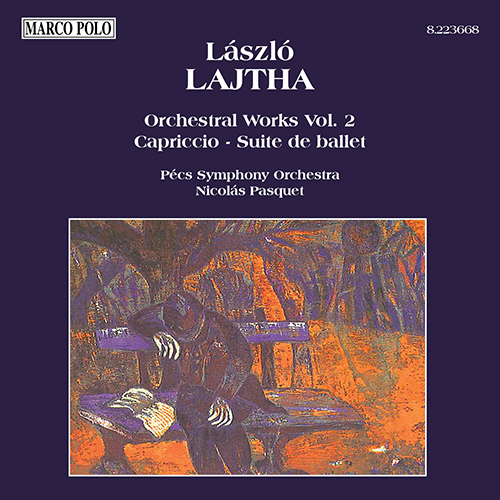LAJTHA, L.: Capriccio (Pécs Symphony, Pasquet)
Tracklist
Pasquet, Nicolas (Conductor)
Pasquet, Nicolas (Conductor)
Pasquet, Nicolas (Conductor)
Pasquet, Nicolas (Conductor)
Pasquet, Nicolas (Conductor)
Pasquet, Nicolas (Conductor)
Pasquet, Nicolas (Conductor)
Pasquet, Nicolas (Conductor)
Pasquet, Nicolas (Conductor)
Pasquet, Nicolas (Conductor)
Pasquet, Nicolas (Conductor)
Pasquet, Nicolas (Conductor)
Pasquet, Nicolas (Conductor)
Pasquet, Nicolas (Conductor)
Pasquet, Nicolas (Conductor)
The city of Pécs, in the South East of Hungary, is an important cultural centre, with a symphony orchestra that continues a tradition of some two and a half centuries. After its reorganisation in 1984, the Pécs Symphony Orchestra undertook a series of important concert tours abroad with performances throughout Europe and worked with a number of distinguished conductors. Orchestral repertoire was broadened particularly under the English conductor Howard Williams from 1989, with an increased attention to contemporary music. In 1993 Nicolás Pasquet, winner of the 1987 Besançon competition, was appointed chief conductor. The orchestra now performs as the Pannon Philharmonic Orchestra.

Nicolás Pasquet was born in Montevideo, Uruguay. He studied violin and orchestral conducting in Stuttgart and Nuremberg, and has won several national and international conducting competitions. From 1993 to 1996 Pasquet was chief conductor of the Pécs Symphony Orchestra, and was awarded the Béla Bartók/Ditta Pásztory and László Lajtha Foundation Prizes for his interpretations of Hungarian music. He also has served as chief conductor of the Neubrandenburger Philharmonie and the orchestra of the Coburg State Theatre. His discography includes numerous recordings for Marco Polo, Naxos and Beyer.
Pasquet has been professor for conducting at the University of Music Franz Liszt Weimar since 1994, where he teaches an international conducting class and is chief conductor of the symphony orchestra. Over the years, Pasquet has developed strong collaborative relationships with youth and student orchestras in Germany, Asia and Central America. He is currently chief conductor of the Youth Symphony Orchestra of the state of Hesse, Germany.
A collaborator with the Hungarian composer Bartók and Kodály in the collection of folksongs, László Lajtha held important positions in the musical life of his country as a teacher, conductor, ethnomusicologist, administrator and composer. His music reflects French and Italian influences, rather than German, in a generally tonal context.
Orchestral Music
Lajtha’s nine symphonies were written over a period of 25 years, from 1936 to 1961, and demonstrate the development of his individual style and his interest in counterpoint. His other orchestral works include suites derived from ballets or film scores, the source also of the Third Symphony, drawn from a score for a film of T.S. Eliot’s Murder in the Cathedral.
Chamber Music
Lajtha made considerable and useful additions to chamber-music repertoire, including 10 string quartets, the first two of which remain unpublished, and a number of works for various chamber ensembles.
Piano Music
Lajtha’s Des Écrits d’un musicien was published in 1913, the year in which the composer completed his studies at the Budapest Academy of Music. It was followed in 1914 by Contes (‘Stories’), dedicated to Bartók. The Trois Berceuses were written for his grandchildren in America and England, at a time when Lajtha was banned from travel abroad.































